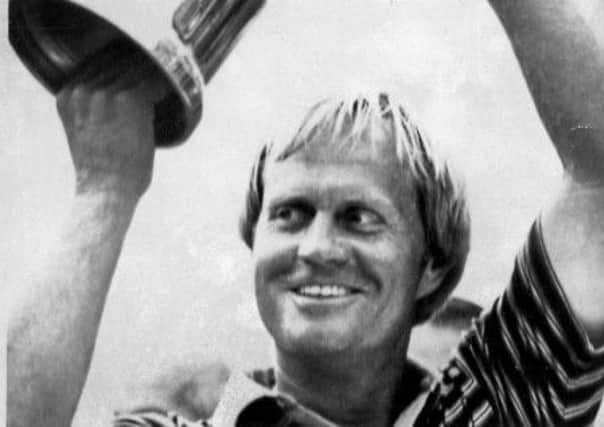Jack Nicklaus holds off Aoki for fourth US Open


The Scotsman - Monday 16 June, 1980
The two-stroke triumph came in record fashion, a hallmark of Nicklaus’s incredible career. And it came at a time when the “Golden Bear” had been written off by so many observers as an over-the-hill, 40-year-old former champion, a man whose victories were all behind him.
He answered his critics as he has done so many times in his unmatched career with his clubs.
Advertisement
Hide AdAdvertisement
Hide AdHe won this one with a 272 total, eight strokes below par on the famed lower course at the Baltusrol golf club.
That broke his own Open scoring record of 275, set here in 1967 when he won his second American national championship.
It enabled Nicklaus to tie Willie Anderson, Ben Hogan and Jack’s boyhood hero, Bobby Jones, as the only four-time winners of the US Open.
Nicklaus’s previous victories came in 1962, his first professional title secured in a play-off with Arnold Palmer, here in 1967, and in the howling winds of Pebble Beach in 1972.
It extended his own record collection of major professional titles to 16. In addition to the four US Open titles, he has won three British Opens (1966, 1970 and 1978), four PGA championships (1963, 1971, 1973 and 1975) and five Masters titles (1963, 1965, 1966, 1972 and 1975).
It was his 67th victory on the american tour but, more importantly, it was his first in two long years.
Not only did it snap the longest non-winning streak of his career, it came in one of the world’s biggest tournaments and returned him to a position of leadership in the game he has ruled so long.
With the grim deteremination that made him the greatest of them all, he returned to work on his golf game. He put his varied business concerns in second place. “I worked harder this year than at any timw since I was a kid,” he said.
Advertisement
Hide AdAdvertisement
Hide AdHe viewed old movies to find the tiny flaws in his swing. He worked with Phil Rodgers to add some shots to his game, the short delicate little saving things around the green. And he refused to become discouraged when it failed to work. He had his disappointments, many of them, but they all faded away into misty memories with his brilliant triumph this hot, humid day.
But it didn’t come easily. He started out today in a tie with the gritty Japanese, Isao Aoki. He was tied again by the surprising Keith Fergus. He was oparting from a lead or a pice of the lead he’d held since opening with a 63 in the first round.
In the last round he did not lead by more than two shots. He didn’t have a chance to relax until the par-5 17th hole. There, he sank a 20-foot birdie putt that placed him two in front with one to go.
Aoki followed him in.
It was only then, only as he walked off the seventy-first green, that he broke into a wide smile. It was only then that he knew he had it.
He also birdied that eighteenth, sinking his ten-12 footer before Aoki, who had elected not to putt before Jack, made his two-footer.
The deliriously happy gallery surged on to the green while Nicklaus, his caddy Angelo Argea, officials and police tried to hold back the crowd.
Aoki, who had taken the greatest player the game has known through 71 holes of stress and strain, bowed politely to Nicklaus before he holed out his birdie.
That gave him a round of par 70 and second alone at 274, also under the record Nicklaus set 13 years ago.
Advertisement
Hide AdAdvertisement
Hide AdTom Watson, who, over the last three-and-a-half years, had supplanted Nicklaus as the leader of world golf, ties with Fergus and long-hitting Lon Hinkle for third at 276.
Fergus, who was in a tie for second and threatening most of the day, matched par 70.
Hinkle, the easy-going guy who created such a controversy when he found a shortcut on a hole in the 1979 Open, shot 71.